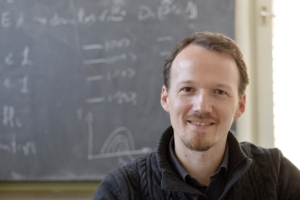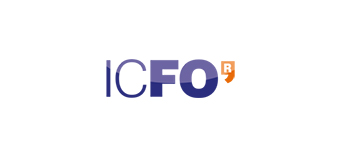Solving difficult problems using quantum technologies: quantum simulation and beyond
Philipp Hauke (Università di Trento)
ABSTRACT:
We are currently witnessing what is called “the second quantum revolution”, in the wake of which the precise manipulation of individual quantum constituents has become possible. In this lecture, I will highlight how this ability enables the engineering—from the bottom up—of quantum devices that promise to help in computing the dynamics of interesting quantum many-body systems. I will showcase the recent progress in the field using examples from quantum biology [1,2] and subatomic physics [3]. I will also briefly illustrate salient challenges and further promising near-term applications of quantum devices [4,5]. With these examples, I hope to give a glimpse at the current exciting progress and the fascinating future potential of quantum technologies.
RECOMMENDED PAPERS:
- Environment-assisted quantum transport in a 10-qubit network. Ch. Maier, T. Brydges, P. Jurcevic, N. Trautmann, C. Hempel, B. Lanyon, P. Hauke, R. Blatt, Ch. Roos. Phys. Rev. Lett. 122, 050501 (2019)
- Dominant Reaction Pathways by Quantum Computing. P. Hauke, G. Mattiotti, P. Faccioli. Phys. Rev. Lett. 126, 028104 (2021)
- Observation of gauge invariance in a 71-site quantum simulator. B. Yang, H. Sun, R. Ott, H.-Y. Wang, T. V. Zache, J. C. Halimeh, Z.-S. Yuan, P. Hauke, J.-W. Pan. Nature 587, 392-396 (2020)
- Can one trust quantum simulators?. P. Hauke, F. Cucchietti, L. Tagliacozzo, I. Deutsch, and M. Lewenstein. Reports on Progress in Physics 75, 082401 (2012)
- Perspectives of quantum annealing: Methods and implementations. P. Hauke, H. G. Katzgraber, W. Lechner, H. Nishimori, W. D. Oliver. Reports on Progress in Physics 83, 054401 (2020).
BIO:
 Philipp Hauke is Associate Professor at the University of Trento. Before that, he held positions as University Assistant at the University of Innsbruck and as group leader at Heidelberg University. Philipp studied physics at TU Munich, EPF Lausanne, and the Max-Planck-Institute of Quantum Optics, Garching. His PhD thesis at ICFO – The Institute of Photonic Sciences, on the topic of quantum simulation in ultracold-atom systems has received various international recognitions, including the ICFO PhD Thesis Award, invitations as finalist for Thesis Prizes of the American Physical Society and the German Physical Society, as well as an Honourable mention of the Václav Votruba Prize. He currently holds an ERC Starting Grant to investigate the role of entanglement in quantum many-body systems. Research in Philipp Hauke’s group focuses on the use of synthetic quantum matter for novel quantum technologies, in particular for quantum simulation, quantum metrology, and quantum annealing.
Philipp Hauke is Associate Professor at the University of Trento. Before that, he held positions as University Assistant at the University of Innsbruck and as group leader at Heidelberg University. Philipp studied physics at TU Munich, EPF Lausanne, and the Max-Planck-Institute of Quantum Optics, Garching. His PhD thesis at ICFO – The Institute of Photonic Sciences, on the topic of quantum simulation in ultracold-atom systems has received various international recognitions, including the ICFO PhD Thesis Award, invitations as finalist for Thesis Prizes of the American Physical Society and the German Physical Society, as well as an Honourable mention of the Václav Votruba Prize. He currently holds an ERC Starting Grant to investigate the role of entanglement in quantum many-body systems. Research in Philipp Hauke’s group focuses on the use of synthetic quantum matter for novel quantum technologies, in particular for quantum simulation, quantum metrology, and quantum annealing.
